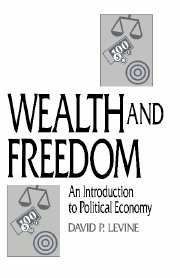Book contents
- Frontmatter
- Contents
- List of figures and tables
- Preface
- Introduction
- I Economy and society
- II Capitalism
- III Inequality and difference
- 7 The classical argument for inequality
- 8 Income and productive contribution
- 9 Rights and the market
- 10 Poverty and inequality
- IV International society
- V Individual and community
- References
- Index
8 - Income and productive contribution
Published online by Cambridge University Press: 20 March 2010
- Frontmatter
- Contents
- List of figures and tables
- Preface
- Introduction
- I Economy and society
- II Capitalism
- III Inequality and difference
- 7 The classical argument for inequality
- 8 Income and productive contribution
- 9 Rights and the market
- 10 Poverty and inequality
- IV International society
- V Individual and community
- References
- Index
Summary
Contribution equals remuneration
At the end of the previous chapter, I introduced the notion of equal opportunity and linked it to the idea that what we accomplish is up to us and not imposed by group memberships over which we have no control. This idea lays the groundwork for another argument in support of the fairness of the inequalities implied in linking income to property ownership. This argument focuses on a connection between income and productive contribution. If we can argue that our income equals our contribution, then we can be said to take out what we put in. We might even go so far as to say that we get what we deserve.
Getting what we deserve encourages us to feel that our economy has distributed income fairly. But, more than this, it makes income distribution an incentive system. If what we get varies with our productive contribution, our desire to get more will lead us to try and contribute more. If working harder, being more skillful or creative, or developing new more productive methods will lead to a commensurate increase in our income, income acts as an incentive to hard work, skill, and invention. If, however, we receive an income independent of these attributes of our work effort, income does not provide an incentive to increase or otherwise improve our effort. We may find other reasons for working hard and being creative, but narrow self-interest (in our material well-being) will not push us in that direction.
- Type
- Chapter
- Information
- Wealth and FreedomAn Introduction to Political Economy, pp. 88 - 98Publisher: Cambridge University PressPrint publication year: 1995



